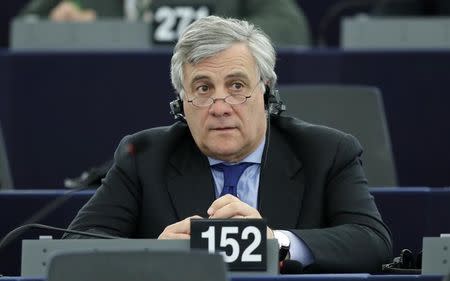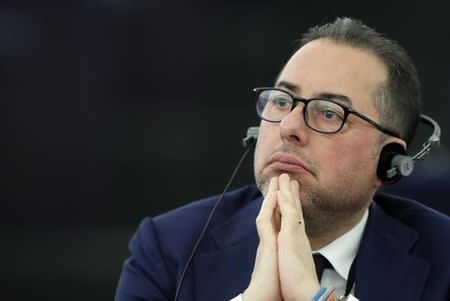EU parliament votes on speaker, pro-EU bloc forms
By Francesco Guarascio STRASBOURG (Reuters) - The European liberal party ALDE withdrew its candidate from Tuesday's ballot to elect a new speaker of the European Parliament and backed the centre-right favourite, seeking a new pro-EU coalition. The surprise withdrawal of centrist Guy Verhofstadt, a former Belgian prime minister, before voting began, appeared to strengthen the hand of Italian conservative Antonio Tajani and underlined how mainstream, pro-EU parties are trying to keep a grip on the legislature against a vocal eurosceptic minority. Verhofstadt, a leading European federalist who is also the parliament's point man on the Brexit negotiations, highlighted the challenges the Union faces, including hostility from Russian President Vladimir Putin and U.S. President-elect Donald Trump. Voting in the 751-seat chamber in Strasbourg will conclude by Tuesday evening. If none of the six candidates has an absolute majority of votes cast in the first three secret ballots, the leading two will contest a deciding round. The vote has been unusually controversial since the centre-left S&D group, the second biggest after the centre-right EPP, broke a grand coalition deal that also include ALDE in order to field its own candidate to succeed President Martin Schulz. The S&D had previously agreed, when its candidate Schulz was re-elected in 2014 with EPP backing, to support an EPP candidate this time round. That rift in the mainstream has been seen as giving a potentially greater voice to eurosceptics who have been bolstered by Britain's referendum vote last year to quit the EU. Centre-left leader Gianni Pittella, also Italian, is Tajani's main challenger. The showdown could give a kingmaker role to anti-EU parties, including Marine Le Pen and her French National Front and British Brexit campaigner Nigel Farage and his 20-strong delegation from the UK Independence Party. POWERS The Parliament has substantial powers to block or amend EU legislation sought by the executive Commission and the Council of member states. Schulz, who is returning to a prominent role in German domestic politics, had worked in the framework of the grand coalition to smooth the passage of legislation with the centre-right Commission President Jean-Claude Juncker. A win for Tajani would give the EPP control of all three presidencies of the key EU political institutions, raising calls in some quarters for either Juncker or European Council President Donald Tusk to make way for a figure from the left. However, there is no clear consensus on that happening. Verhofstadt said of his party's alliance with the centre-right: "It is a first and important step in the building up of a pro-European coalition ... that is absolutely necessary with Trump, with Putin, with many other challenges Europe faces." European Parliament officials said not all 68 of ALDE's lawmakers may back Tajani, a former European industry commissioner. The EPP has 217 seats, while the S&D has 189. Tajani, 63, has been a close ally of Italy's former prime minister Silvio Berlusconi. Parliament will also have to sign off on a divorce deal with Britain, probably by late 2018 or early 2019, just as lawmakers are campaigning for an EU-wide legislative election in May 2019. Tajani said: "We need to be very balanced, we need to defend the rights of Europe but we also have to think that in the future the UK will be an important partner for us." (Additional reporting by Robert-Jan Bartunek; Writing by Alastair Macdonald; Editing Alissa de Carbonnel)



